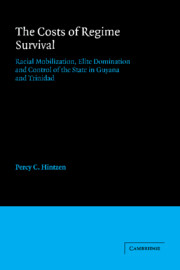 The Costs of Regime Survival
The Costs of Regime Survival Book contents
- Frontmatter
- Contents
- Acknowledgements
- 1 Regime survival and control of the post-colonial state
- 2 Mobilization for control of the state in Guyana and Trinidad
- 3 Maintaining control of the state: strategies for regime survival in Guyana and Trinidad
- 4 Elite support and control of the state: race, ideology,and clientelism
- 5 Regime survival and state control of the economy
- 6 The political and economic costs of regime survival
- 7 Collective needs versus the demands of powerful actors in less developed countries
- Appendix
- Bibliography
- Index
- Other books in the series
4 - Elite support and control of the state: race, ideology,and clientelism
Published online by Cambridge University Press: 08 October 2009
- Frontmatter
- Contents
- Acknowledgements
- 1 Regime survival and control of the post-colonial state
- 2 Mobilization for control of the state in Guyana and Trinidad
- 3 Maintaining control of the state: strategies for regime survival in Guyana and Trinidad
- 4 Elite support and control of the state: race, ideology,and clientelism
- 5 Regime survival and state control of the economy
- 6 The political and economic costs of regime survival
- 7 Collective needs versus the demands of powerful actors in less developed countries
- Appendix
- Bibliography
- Index
- Other books in the series
Summary
One of the central arguments of the previous chapters is that regime survival is directly tied to its ability to accommodate, neutralize, or eliminate powerful and influential actors who control politically strategic resources. Such actors are able to employ their formidable resources to make the task of retaining power impossible for a political directorate. They have the wherewithal to mount or support mobilization efforts against a regime and to undertake efforts aimed at destabilizing the political economy and at disrupting social order.
Accommodation implies the commitment of a regime to formulate and implement policies and programs which protect and further the interests represented by powerful and influential leaders. Such policies and programs need not be consistent with the regime's ideological position. In the context of strategies for regime survival, ideology constitutes a means of gaining support from strategic actors through a declared commitment to further and protect their interests. The regime might find itself under no obligation to follow through on such commitments particularly when the conditions of power have changed.
In the internal power equation, the political directorate is by far the most dominant element because of the economic, political, and social resources under its control and because of its central role in conflict management and order maintenance, not to speak of its near monopolization of coercion. To the extent that this directorate is unified and integrated, the regime, as its dominant element, has the wherewithal through its control of the state to preempt and overcome domestic elite opposition to its policies.
- Type
- Chapter
- Information
- The Costs of Regime SurvivalRacial Mobilization, Elite Domination and Control of the State in Guyana and Trinidad, pp. 103 - 125Publisher: Cambridge University PressPrint publication year: 1989


